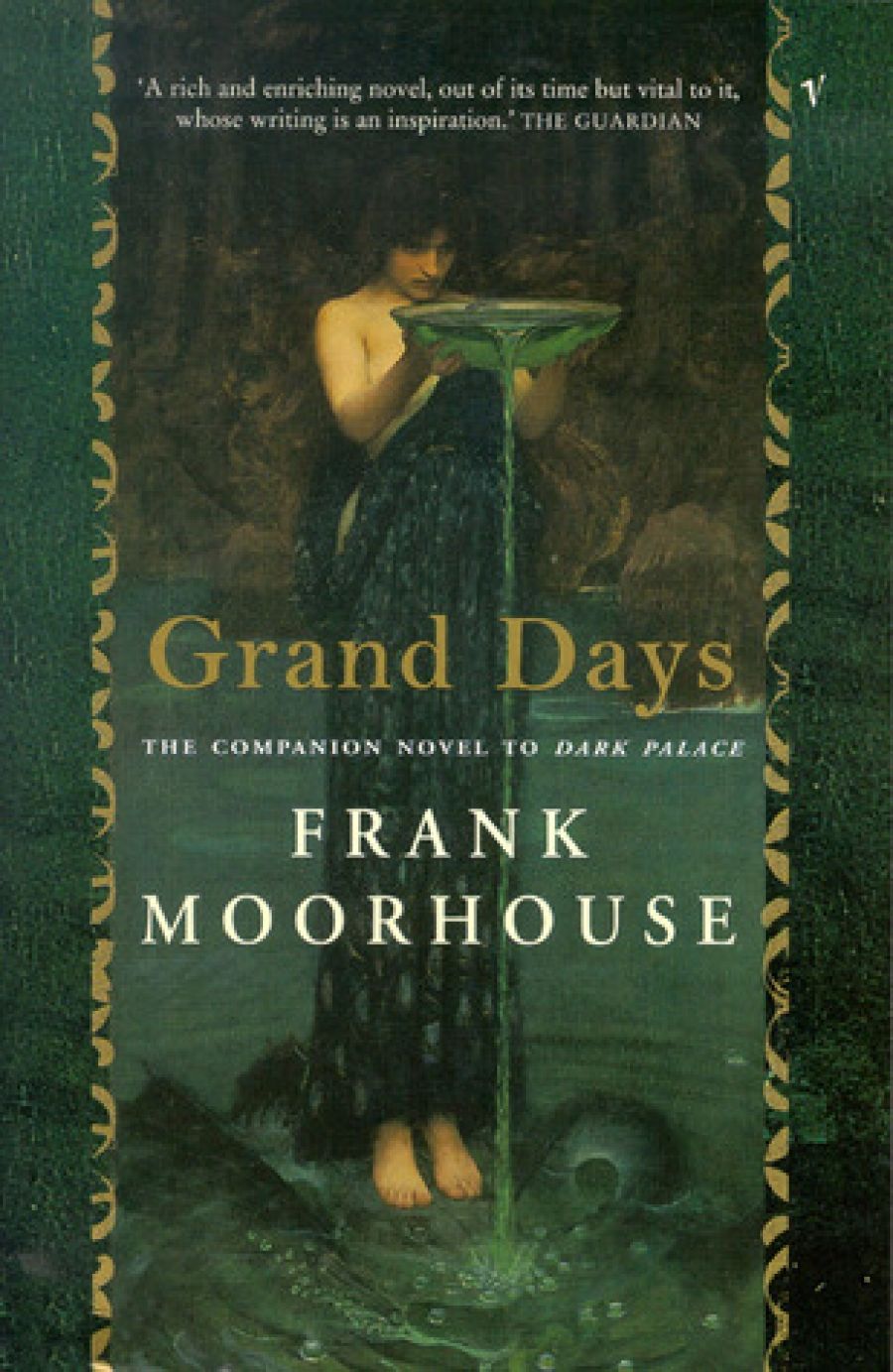
- Free Article: No
- Contents Category: Fiction
- Review Article: Yes
- Online Only: No
- Custom Highlight Text:
Grand Days is volume one of Frank Moorhouse’s Palais des Nations novels, and is connected to the author’s previous works Forty-Seventeen and The Electrical Experience by the characters of Edith Campbell Berry and George McDowell. The principal narrative of Grand Days goes on for 500 or so pages, and is followed by some thirty pages of notes and explanations which form another narrative. The most interesting narrative of all, to me, however, is the story of where this book fits into the life and work of Frank Moorhouse.
- Book 1 Title: Grand Days
- Book 1 Biblio: Macmillan, $35 hb
My remarks are not entirely perverse, since Moorhouse has taken such pains to supply the reader of Grand Days with an exhaustive list of acknowledgements as well as notes on how the League of Nations organised its registry, and how a duplicating machine works. He includes a Who is Who where you will find the names of people who have existed in real life as well as people Moorhouse has invented. The Covenant of the League of Nations is also here. (Australia is of course listed as a country of the British Empire.)
You can see that there is a grand formality about the placing of the narrative and other documents within the structure of the book. This formality extends to the naming of chapters, only one of which (the first) really reminds the reader of the way Frank Moorhouse used to do it: ‘How Edith Campbell Berry Ate Six Courses and Practised the Seven Ways in the Dining Car on the Train from Paris to Geneva’.
There is a similar formality in the prose:
Standing together in the dim corridor after the train moved out on its last few miles to Geneva, looking out of the window, she admitted to him that she was rather elated at the idea of arriving in Geneva and with working for the League and she hoped that, when there, he might guide her in her work and watch over her a little.
Edith’s language and thoughts preserve this tone throughout the novel. ‘She had no intention of becoming a loose woman, and she considered that perhaps a few experiences before marriage was modern but that there was a boundary line and she was approaching it. She had no intention of becoming like Iris in The Green Hat.’
The character of Edith is not one you would expect to be the heroine of a novel, ever. Any more than you would expect the League of Nations to provide the subject matter and background. But Edith, with her Ways of Going to guide her, and her sensible clothes and her mother’s fabulously practical leather handbag, is strangely fascinating. She is, in a flat, odd way, very funny. She is also sad. She’s a twenty-six-year-old serious-minded Australian at large in Geneva in the 1920s and 1930s. You might have expected a man to be the one to tell you about how things were in the League of Nations. It seems to me to be canny and right to deliver this story through Edith.
Frank Moorhouse says he is writing about the League ‘because it is a trunk in the attic of history which has not been properly opened. It contains haunted, bitter, and embarrassing memories for the world, but it was also a human experiment of grandeur. Its stories deserve more space in our cultural imagination.’ The whole idea driving this novel, then, is feminine. And Edith’s leather handbag, her corsets and her stockings and her underwear are an imaginative reconstruction of the objects in the attic of history. The quixotic aim of peace on earth, the League’s effort to bring about permanent international cooperation and to prevent war, manifests here as a feminine attitude to life. We see this travestied in a personal sense by the character Ambrose (the man who, in the first chapter of the novel, kissed Edith). For Ambrose likes to wear Edith’s clothes, and, when he dresses up in her tulle evening dress with the sequins, Edith feels she might give the dress to him, for it will never be the same for her again.
Through our feelings for Edith, we are able to take an emotional position towards the League of Nations. The novel is a powerful work of the imagination. If Moorhouse had simply written a history of the League, we would have had the facts, but with the novel we actually feel the hope and the disaster of the enterprise. This is a remarkable thing. The historical novels I used to read always took as their subject, I think, the wild and wonderful bits of what has happened on the planet. By opening up the attic of the things that happened in Geneva in the 1920s and 1930s, Frank Moorhouse has done something rare, strange, and important. The overall tone is sad and bitter, but not without a certain preservation of hope in the possibility of goodness and a means to peace.
When the Palais des Nations novels are complete, there must be that other book about the writing of those novels. If you think this is a tedious postmodern suggestion imposed on a work of traditional fiction, look at the volume of Grand Days carefully. You will find there a postmodern text, part of which is a novel.


Comments powered by CComment